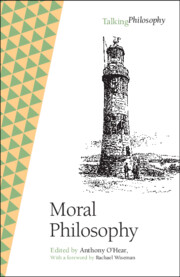Book contents
- Moral Philosophy
- Talking Philosophy
- Moral Philosophy
- Copyright page
- Contents
- Foreword
- Preface
- List of Contributors
- Rationality and Goodness
- Acting well
- Apprehending Human Form
- Does Modern Moral Philosophy Rest on a Mistake?
- Absolutes and Particulars
- On the So-called Logic of Practical Inference
- Absolute Prohibitions without Divine Promises
- Moral Obligation
- The Lesser Evil
- The Ethics of Co-operation in Wrongdoing
- Authority
- The Force of Numbers
- Reason, Intention, and Choice
- Modern Moral Philosophy and the Problem of Relevant Descriptions
- Index
The Ethics of Co-operation in Wrongdoing
Published online by Cambridge University Press: 19 May 2022
- Moral Philosophy
- Talking Philosophy
- Moral Philosophy
- Copyright page
- Contents
- Foreword
- Preface
- List of Contributors
- Rationality and Goodness
- Acting well
- Apprehending Human Form
- Does Modern Moral Philosophy Rest on a Mistake?
- Absolutes and Particulars
- On the So-called Logic of Practical Inference
- Absolute Prohibitions without Divine Promises
- Moral Obligation
- The Lesser Evil
- The Ethics of Co-operation in Wrongdoing
- Authority
- The Force of Numbers
- Reason, Intention, and Choice
- Modern Moral Philosophy and the Problem of Relevant Descriptions
- Index
Summary
There are a number of ways in which a person can share the guilt of another’s wrongdoing. He might advise it, command it or consent to it. He might provoke it, praise it, flatter the wrongdoer, or conceal the wrong. He might stay silent when there is a clear duty to denounce the wrong or its perpetrator; or he might positively defend the wrong done. Finally, he might actively participate or co-operate in the wrongdoing. These various activities, apart from cooperation, typically occur before or after the commission of the wrong itself, only provocation being essentially before the fact. As such they fall into the categories of seduction or comfort, seduction being essentially pre-commission and comfort post-commission.1 In seduction (mutatis mutandis for comfort), the seducer typically leads another into doing wrong who has not definitely made up his mind. He does not assist in the commission, but he leads to its occurring. If the principal (as I will call the one who commits the wrong) has made up his mind, actions which might otherwise amount to seduction are best characterized as amounting to scandal, since they do not lead to wrong but reinforce the principal in his wrongful intent or provide to third parties a bad example since they connote approval of the principal’s action.2 Closely related to the concept of seduction is that of solicitation, though perhaps these are best thought of as two aspects of the same kind of activity. Seduction can be thought of as a strong form of inducement to wrong, typified by command, counsel (where the seducer knows the advice is likely to be relied upon) and enticement through praise or provocation. Solicitation is a softer form of inducement typically involving requests, appeals, and invitations. Whereas the seducer or solicitor leads another into wrong but does not assist in its commission, the co-operator does not lead the principal into wrong but assists in its commission.
- Type
- Chapter
- Information
- Moral Philosophy , pp. 313 - 353Publisher: Cambridge University PressPrint publication year: 2022

